In this post, we develop two Apache Beam pipelines that calculate average word lengths from input texts that are ingested by a Kafka topic. They obtain the statistics in different angles. The first pipeline emits the global average lengths whenever a new input text arrives while the latter triggers those values in a sliding time window.
- Part 1 Calculate K Most Frequent Words and Max Word Length
- Part 2 Calculate Average Word Length with/without Fixed Look back (this post)
- Part 3 Build Sport Activity Tracker with/without SQL
- Part 4 Call RPC Service for Data Augmentation
- Part 5 Call RPC Service in Batch using Stateless DoFn
- Part 6 Call RPC Service in Batch with Defined Batch Size using Stateful DoFn
- Part 7 Separate Droppable Data into Side Output
- Part 8 Enhance Sport Activity Tracker with Runner Motivation
- Part 9 Develop Batch File Reader and PiSampler using Splittable DoFn
- Part 10 Develop Streaming File Reader using Splittable DoFn
Development Environment
The development environment has an Apache Flink cluster and Apache Kafka cluster and gRPC server. The gRPC server will be used in Part 4 to 6. For Flink, we can use either an embedded cluster or a local cluster while Docker Compose is used for the rest. See Part 1 for details about how to set up the development environment. The source of this post can be found in this GitHub repository.
Manage Environment
The Flink and Kafka clusters and gRPC server are managed by the following bash scripts.
./setup/start-flink-env.sh./setup/stop-flink-env.sh
Those scripts accept four flags: -f, -k and -g to start/stop individual resources or -a to manage all of them. We can add multiple flags to start/stop relevant resources. Note that the scripts assume Flink 1.18.1 by default, and we can specify a specific Flink version if it is different from it e.g. FLINK_VERSION=1.17.2 ./setup/start-flink-env.sh.
Below shows how to start resources using the start-up script. We need to launch both the Flink and Kafka clusters if we deploy a Beam pipeline on a local Flink cluster. Otherwise, we can start the Kafka cluster only.
1## start a local flink can kafka cluster
2./setup/start-flink-env.sh -f -k
3# start kafka...
4# [+] Running 6/6
5# ⠿ Network app-network Created 0.0s
6# ⠿ Volume "zookeeper_data" Created 0.0s
7# ⠿ Volume "kafka_0_data" Created 0.0s
8# ⠿ Container zookeeper Started 0.3s
9# ⠿ Container kafka-0 Started 0.5s
10# ⠿ Container kafka-ui Started 0.8s
11# start flink 1.18.1...
12# Starting cluster.
13# Starting standalonesession daemon on host <hostname>.
14# Starting taskexecutor daemon on host <hostname>.
15
16## start a local kafka cluster only
17./setup/start-flink-env.sh -k
18# start kafka...
19# [+] Running 6/6
20# ⠿ Network app-network Created 0.0s
21# ⠿ Volume "zookeeper_data" Created 0.0s
22# ⠿ Volume "kafka_0_data" Created 0.0s
23# ⠿ Container zookeeper Started 0.3s
24# ⠿ Container kafka-0 Started 0.5s
25# ⠿ Container kafka-ui Started 0.8s
Kafka Text Producer
We create a Kafka producer using the kafka-python package. It generates text messages with the Faker package and sends them to an input topic. We can run the producer simply by executing the producer script. See Part 1 for details about the Kafka producer.
Beam Pipelines
We develop two Apache Beam pipelines that calculate average word lengths from input texts that are ingested by a Kafka topic. The first pipeline emits the global average lengths whenever a new input text arrives while the latter triggers those values in a sliding time window.
Shared Transforms
Both the pipelines read text messages from an input Kafka topic and write outputs to an output topic. Therefore, the data source and sink transforms are refactored into a utility module as shown below. Note that, the Kafka read and write transforms have an argument called deprecated_read, which forces to use the legacy read when it is set to True. We will use the legacy read in this post to prevent a problem that is described in this GitHub issue.
1# chapter2/word_process_utils.py
2import re
3import typing
4
5import apache_beam as beam
6from apache_beam import pvalue
7from apache_beam.io import kafka
8
9
10def decode_message(kafka_kv: tuple):
11 print(kafka_kv)
12 return kafka_kv[1].decode("utf-8")
13
14
15def tokenize(element: str):
16 return re.findall(r"[A-Za-z\']+", element)
17
18
19class ReadWordsFromKafka(beam.PTransform):
20 def __init__(
21 self,
22 bootstrap_servers: str,
23 topics: typing.List[str],
24 group_id: str,
25 deprecated_read: bool,
26 verbose: bool = False,
27 label: str | None = None,
28 ) -> None:
29 super().__init__(label)
30 self.boostrap_servers = bootstrap_servers
31 self.topics = topics
32 self.group_id = group_id
33 self.verbose = verbose
34 self.expansion_service = None
35 if deprecated_read:
36 self.expansion_service = kafka.default_io_expansion_service(
37 ["--experiments=use_deprecated_read"]
38 )
39
40 def expand(self, input: pvalue.PBegin):
41 return (
42 input
43 | "ReadFromKafka"
44 >> kafka.ReadFromKafka(
45 consumer_config={
46 "bootstrap.servers": self.boostrap_servers,
47 "auto.offset.reset": "latest",
48 # "enable.auto.commit": "true",
49 "group.id": self.group_id,
50 },
51 topics=self.topics,
52 timestamp_policy=kafka.ReadFromKafka.create_time_policy,
53 commit_offset_in_finalize=True,
54 expansion_service=self.expansion_service,
55 )
56 | "DecodeMessage" >> beam.Map(decode_message)
57 )
58
59
60class WriteProcessOutputsToKafka(beam.PTransform):
61 def __init__(
62 self,
63 bootstrap_servers: str,
64 topic: str,
65 deprecated_read: bool, # TO DO: remove as it applies only to ReadFromKafka
66 label: str | None = None,
67 ) -> None:
68 super().__init__(label)
69 self.boostrap_servers = bootstrap_servers
70 self.topic = topic
71 # TO DO: remove as it applies only to ReadFromKafka
72 self.expansion_service = None
73 if deprecated_read:
74 self.expansion_service = kafka.default_io_expansion_service(
75 ["--experiments=use_deprecated_read"]
76 )
77
78 def expand(self, pcoll: pvalue.PCollection):
79 return pcoll | "WriteToKafka" >> kafka.WriteToKafka(
80 producer_config={"bootstrap.servers": self.boostrap_servers},
81 topic=self.topic,
82 expansion_service=self.expansion_service,
83 )
Calculate Average Word Length
The main transform of this pipeline (CalculateAverageWordLength) performs
Windowing: assigns input text messages into a global window with the following configuration.- Emits (or triggers) the result for every new input text (
trigger=Repeatedly(AfterCount(1))) - Disallows Late data (
allowed_lateness=0) - Assigns the output timestamp from the latest input timestamp (
timestamp_combiner=TimestampCombiner.OUTPUT_AT_LATEST)- By default, the end of window timestamp is taken, but it is so distance future for the global window. Therefore, we take the latest timestamp of the input elements instead.
- Configures
ACCUMULATINGfor calculating global average (accumulation_mode=AccumulationMode.ACCUMULATING)- Either
DISCARDING(reset the result when fired) orACCUMULATING(keep the previous result).
- Either
- Emits (or triggers) the result for every new input text (
Tokenize: tokenizes (or converts) text into words.GetAvgWordLength: calculates the average word lengths by combining all words using a custom combine function (AverageFn).- Using an accumulator,
AverageFnobtains the average word length by dividing the sum of lengths with the number of words.
- Using an accumulator,
Also, it adds the window start and end timestamps when creating output messages (CreateMessags).
1# chapter2/average_word_length.py
2import os
3import json
4import argparse
5import re
6import logging
7import typing
8
9import apache_beam as beam
10from apache_beam import pvalue
11from apache_beam.transforms.window import GlobalWindows, TimestampCombiner
12from apache_beam.transforms.trigger import AfterCount, AccumulationMode, Repeatedly
13from apache_beam.transforms.util import Reify
14from apache_beam.options.pipeline_options import PipelineOptions
15from apache_beam.options.pipeline_options import SetupOptions
16
17from word_process_utils import tokenize, ReadWordsFromKafka, WriteProcessOutputsToKafka
18
19
20class AvgAccum(typing.NamedTuple):
21 length: int
22 count: int
23
24
25beam.coders.registry.register_coder(AvgAccum, beam.coders.RowCoder)
26
27
28class AverageFn(beam.CombineFn):
29 def create_accumulator(self):
30 return AvgAccum(length=0, count=0)
31
32 def add_input(self, mutable_accumulator: AvgAccum, element: str):
33 length, count = tuple(mutable_accumulator)
34 return AvgAccum(length=length + len(element), count=count + 1)
35
36 def merge_accumulators(self, accumulators: typing.List[AvgAccum]):
37 lengths, counts = zip(*accumulators)
38 return AvgAccum(length=sum(lengths), count=sum(counts))
39
40 def extract_output(self, accumulator: AvgAccum):
41 length, count = tuple(accumulator)
42 return length / count if count else float("NaN")
43
44 def get_accumulator_coder(self):
45 return beam.coders.registry.get_coder(AvgAccum)
46
47
48class CalculateAverageWordLength(beam.PTransform):
49 def expand(self, pcoll: pvalue.PCollection):
50 return (
51 pcoll
52 | "Windowing"
53 >> beam.WindowInto(
54 GlobalWindows(),
55 trigger=Repeatedly(AfterCount(1)),
56 allowed_lateness=0,
57 timestamp_combiner=TimestampCombiner.OUTPUT_AT_LATEST,
58 accumulation_mode=AccumulationMode.ACCUMULATING,
59 # closing behaviour - EMIT_ALWAYS, on_time_behavior - FIRE_ALWAYS
60 )
61 | "Tokenize" >> beam.FlatMap(tokenize)
62 | "GetAvgWordLength"
63 >> beam.CombineGlobally(
64 AverageFn()
65 ).without_defaults() # DAG gets complicated if with_default()
66 )
67
68
69def create_message(element: typing.Tuple[str, float]):
70 msg = json.dumps(dict(zip(["created_at", "avg_len"], element)))
71 print(msg)
72 return "".encode("utf-8"), msg.encode("utf-8")
73
74
75class AddTS(beam.DoFn):
76 def process(self, avg_len: float, ts_param=beam.DoFn.TimestampParam):
77 yield ts_param.to_rfc3339(), avg_len
78
79
80class CreateMessags(beam.PTransform):
81 def expand(self, pcoll: pvalue.PCollection):
82 return (
83 pcoll
84 | "ReifyTimestamp" >> Reify.Timestamp()
85 | "AddTimestamp" >> beam.ParDo(AddTS())
86 | "CreateMessages"
87 >> beam.Map(create_message).with_output_types(typing.Tuple[bytes, bytes])
88 )
89
90
91def run(argv=None, save_main_session=True):
92 parser = argparse.ArgumentParser(description="Beam pipeline arguments")
93 parser.add_argument(
94 "--bootstrap_servers",
95 default="host.docker.internal:29092",
96 help="Kafka bootstrap server addresses",
97 )
98 parser.add_argument("--input_topic", default="input-topic", help="Input topic")
99 parser.add_argument(
100 "--output_topic",
101 default=re.sub("_", "-", re.sub(".py$", "", os.path.basename(__file__))),
102 help="Output topic",
103 )
104 parser.add_argument(
105 "--deprecated_read",
106 action="store_true",
107 default="Whether to use a deprecated read. See https://github.com/apache/beam/issues/20979",
108 )
109 parser.set_defaults(deprecated_read=False)
110
111 known_args, pipeline_args = parser.parse_known_args(argv)
112
113 # # We use the save_main_session option because one or more DoFn's in this
114 # # workflow rely on global context (e.g., a module imported at module level).
115 pipeline_options = PipelineOptions(pipeline_args)
116 pipeline_options.view_as(SetupOptions).save_main_session = save_main_session
117 print(f"known args - {known_args}")
118 print(f"pipeline options - {pipeline_options.display_data()}")
119
120 with beam.Pipeline(options=pipeline_options) as p:
121 (
122 p
123 | "ReadInputsFromKafka"
124 >> ReadWordsFromKafka(
125 bootstrap_servers=known_args.bootstrap_servers,
126 topics=[known_args.input_topic],
127 group_id=f"{known_args.output_topic}-group",
128 deprecated_read=known_args.deprecated_read,
129 )
130 | "CalculateAverageWordLength" >> CalculateAverageWordLength()
131 | "CreateMessags" >> CreateMessags()
132 | "WriteOutputsToKafka"
133 >> WriteProcessOutputsToKafka(
134 bootstrap_servers=known_args.bootstrap_servers,
135 topic=known_args.output_topic,
136 deprecated_read=known_args.deprecated_read,
137 )
138 )
139
140 logging.getLogger().setLevel(logging.WARN)
141 logging.info("Building pipeline ...")
142
143
144if __name__ == "__main__":
145 run()
Pipeline Test
As described in this documentation, we can test a Beam pipeline as following.
- Create a
TestPipeline. - Create some static, known test input data.
- Create a
PCollectionof input data using theCreatetransform (if bounded source) or aTestStream(if unbounded source) - Apply the transform to the input
PCollectionand save the resulting outputPCollection. - Use
PAssertand its subclasses (or testing utils in Python) to verify that the outputPCollectioncontains the elements that you expect.
We have three elements and the pipeline should emit the average word length whenever a new element is delivered. Therefore, the expected average word length values are 1 (1/1), 1.5 (3/2) and 2 (6/3).
1# chapter2/average_word_length_test.py
2import unittest
3
4from apache_beam.coders import coders
5from apache_beam.testing.test_pipeline import TestPipeline
6from apache_beam.testing.util import assert_that, equal_to
7from apache_beam.testing.test_stream import TestStream
8from apache_beam.options.pipeline_options import PipelineOptions, StandardOptions
9
10from average_word_length import CalculateAverageWordLength
11
12
13class MaxWordLengthTest(unittest.TestCase):
14 def test_windowing_behaviour(self):
15 options = PipelineOptions()
16 options.view_as(StandardOptions).streaming = True
17 with TestPipeline(options=options) as p:
18 """
19 We should put each element separately. The reason we do this is to ensure
20 that our trigger will be invoked in between each element. Because the trigger
21 invocation is optional, a runner might skip a particular firing. Putting each element
22 separately into addElements makes DirectRunner (our testing runner) invokes a trigger
23 for each input element.
24 """
25 test_stream = (
26 TestStream(coder=coders.StrUtf8Coder())
27 .with_output_types(str)
28 .add_elements(["a"])
29 .add_elements(["bb"])
30 .add_elements(["ccc"])
31 .advance_watermark_to_infinity()
32 )
33
34 output = (
35 p
36 | test_stream
37 | "CalculateMaxWordLength" >> CalculateAverageWordLength()
38 )
39
40 EXPECTED_OUTPUT = [1.0, 1.5, 2.0]
41
42 assert_that(output, equal_to(EXPECTED_OUTPUT))
43
44
45if __name__ == "__main__":
46 unittest.main()
We can execute the pipeline test as shown below.
1python chapter2/average_word_length_test.py -v
2test_windowing_behaviour (__main__.MaxWordLengthTest) ... ok
3
4----------------------------------------------------------------------
5Ran 1 test in 0.343s
6
7OK
Pipeline Execution
Note that the Kafka bootstrap server is accessible on port 29092 outside the Docker network, and it can be accessed on localhost:29092 from the Docker host machine and on host.docker.internal:29092 from a Docker container that is launched with the host network. We use both types of the bootstrap server address - the former is used by the Kafka producer app and the latter by a Java IO expansion service, which is launched in a Docker container. Note further that, for the latter to work, we have to update the /etc/hosts file by adding an entry for host.docker.internal as shown below.
1cat /etc/hosts | grep host.docker.internal
2# 127.0.0.1 host.docker.internal
We specify only a single known argument that enables to use the legacy read (--deprecated_read) while accepting default values of the other known arguments (bootstrap_servers, input_topic …). The remaining arguments are all pipeline arguments. Note that we deploy the pipeline on a local Flink cluster by specifying the flink master argument (--flink_master=localhost:8081). Alternatively, we can use an embedded Flink cluster if we exclude that argument.
1## start the beam pipeline
2## exclude --flink_master if using an embedded cluster
3python chapter2/average_word_length.py --deprecated_read \
4 --job_name=avg-word-length --runner FlinkRunner --flink_master=localhost:8081 \
5 --streaming --environment_type=LOOPBACK --parallelism=3 --checkpointing_interval=10000
On Flink UI, we see the pipeline has two tasks. The first task is performed until tokenizing text into words while the second task performs up to sending the average word length records into the output topic.
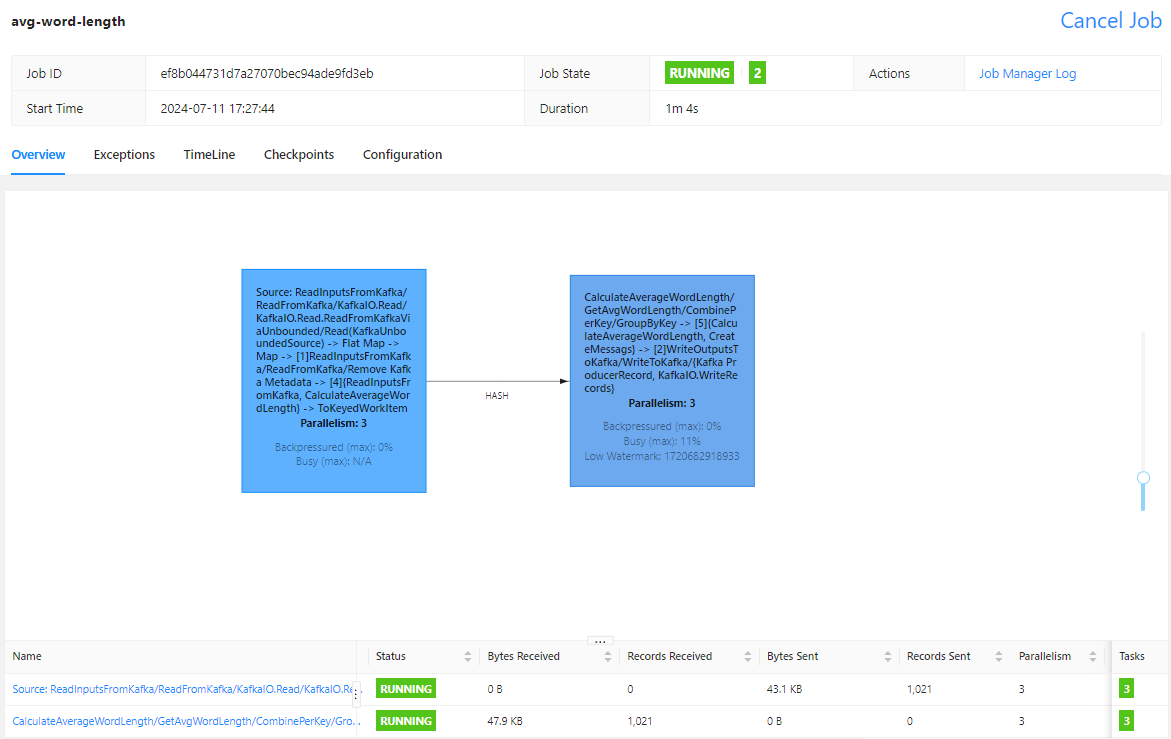
On Kafka UI, we can check the output message includes an average word length and record creation timestamp.
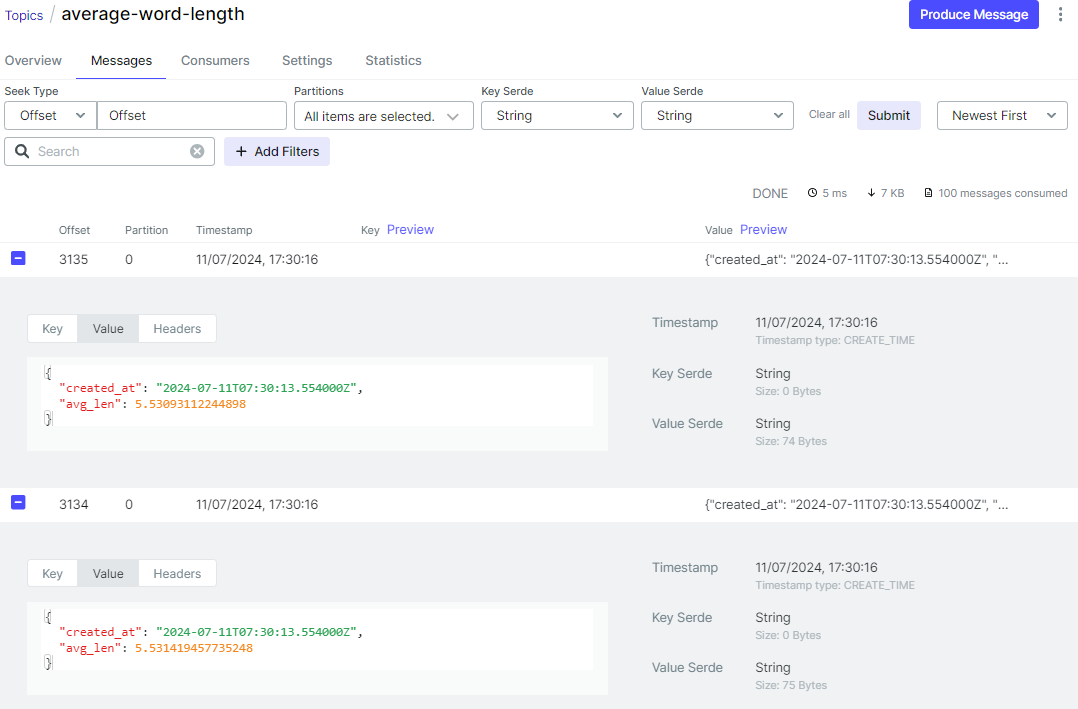
Calculate Average Word Length with Fixed Lookback
The main transform of this pipeline (CalculateAverageWordLength) performs
Windowing: assigns input text messages into a sliding time window where the default size and period are set to 10 and 2 seconds respectively by default. It means it calculates rolling average word lengths in windows of 10 seconds where a new window starts every 2 seconds.Tokenize: tokenizes (or converts) text into wordsGetAvgWordLength: calculates the average word lengths by combining all words using a custom combine function (AverageFn)- Using an accumulator,
AverageFnobtains the average word length by dividing the sum of lengths with the number of words.
- Using an accumulator,
Also, the output window timestamps are added when creating output messages (CreateMessags).
1# chapter2/sliding_window_word_length.py
2import os
3import json
4import argparse
5import re
6import logging
7import typing
8
9import apache_beam as beam
10from apache_beam import pvalue
11from apache_beam.transforms.window import SlidingWindows
12from apache_beam.options.pipeline_options import PipelineOptions
13from apache_beam.options.pipeline_options import SetupOptions
14
15from word_process_utils import tokenize, ReadWordsFromKafka, WriteProcessOutputsToKafka
16
17
18class AvgAccum(typing.NamedTuple):
19 length: int
20 count: int
21
22
23beam.coders.registry.register_coder(AvgAccum, beam.coders.RowCoder)
24
25
26class AverageFn(beam.CombineFn):
27 def create_accumulator(self):
28 return AvgAccum(length=0, count=0)
29
30 def add_input(self, mutable_accumulator: AvgAccum, element: str):
31 length, count = tuple(mutable_accumulator)
32 return AvgAccum(length=length + len(element), count=count + 1)
33
34 def merge_accumulators(self, accumulators: typing.List[AvgAccum]):
35 lengths, counts = zip(*accumulators)
36 return AvgAccum(length=sum(lengths), count=sum(counts))
37
38 def extract_output(self, accumulator: AvgAccum):
39 length, count = tuple(accumulator)
40 return length / count if count else float("NaN")
41
42 def get_accumulator_coder(self):
43 return beam.coders.registry.get_coder(AvgAccum)
44
45
46class CalculateAverageWordLength(beam.PTransform):
47 def __init__(self, size: int, period: int, label: str | None = None) -> None:
48 super().__init__(label)
49 self.size = size
50 self.period = period
51
52 def expand(self, pcoll: pvalue.PCollection):
53 return (
54 pcoll
55 | "Windowing"
56 >> beam.WindowInto(SlidingWindows(size=self.size, period=self.period))
57 | "Tokenize" >> beam.FlatMap(tokenize)
58 | "GetAvgWordLength" >> beam.CombineGlobally(AverageFn()).without_defaults()
59 )
60
61
62def create_message(element: typing.Tuple[str, str, float]):
63 msg = json.dumps(dict(zip(["window_start", "window_end", "avg_len"], element)))
64 print(msg)
65 return "".encode("utf-8"), msg.encode("utf-8")
66
67
68class AddWindowTS(beam.DoFn):
69 def process(self, avg_len: float, win_param=beam.DoFn.WindowParam):
70 yield (
71 win_param.start.to_rfc3339(),
72 win_param.end.to_rfc3339(),
73 avg_len,
74 )
75
76
77class CreateMessags(beam.PTransform):
78 def expand(self, pcoll: pvalue.PCollection):
79 return (
80 pcoll
81 | "AddWindowTS" >> beam.ParDo(AddWindowTS())
82 | "CreateMessages"
83 >> beam.Map(create_message).with_output_types(typing.Tuple[bytes, bytes])
84 )
85
86
87def run(argv=None, save_main_session=True):
88 parser = argparse.ArgumentParser(description="Beam pipeline arguments")
89 parser.add_argument(
90 "--bootstrap_servers",
91 default="host.docker.internal:29092",
92 help="Kafka bootstrap server addresses",
93 )
94 parser.add_argument("--input_topic", default="input-topic", help="Input topic")
95 parser.add_argument(
96 "--output_topic",
97 default=re.sub("_", "-", re.sub(".py$", "", os.path.basename(__file__))),
98 help="Output topic",
99 )
100 parser.add_argument("--size", type=int, default=10, help="Window size")
101 parser.add_argument("--period", type=int, default=2, help="Window period")
102 parser.add_argument(
103 "--deprecated_read",
104 action="store_true",
105 default="Whether to use a deprecated read. See https://github.com/apache/beam/issues/20979",
106 )
107 parser.set_defaults(deprecated_read=False)
108
109 known_args, pipeline_args = parser.parse_known_args(argv)
110
111 # # We use the save_main_session option because one or more DoFn's in this
112 # # workflow rely on global context (e.g., a module imported at module level).
113 pipeline_options = PipelineOptions(pipeline_args)
114 pipeline_options.view_as(SetupOptions).save_main_session = save_main_session
115 print(f"known args - {known_args}")
116 print(f"pipeline options - {pipeline_options.display_data()}")
117
118 with beam.Pipeline(options=pipeline_options) as p:
119 (
120 p
121 | "ReadInputsFromKafka"
122 >> ReadWordsFromKafka(
123 bootstrap_servers=known_args.bootstrap_servers,
124 topics=[known_args.input_topic],
125 group_id=f"{known_args.output_topic}-group",
126 deprecated_read=known_args.deprecated_read,
127 )
128 | "CalculateAverageWordLength"
129 >> CalculateAverageWordLength(
130 size=known_args.size, period=known_args.period
131 )
132 | "CreateMessags" >> CreateMessags()
133 | "WriteOutputsToKafka"
134 >> WriteProcessOutputsToKafka(
135 bootstrap_servers=known_args.bootstrap_servers,
136 topic=known_args.output_topic,
137 deprecated_read=known_args.deprecated_read,
138 )
139 )
140
141 logging.getLogger().setLevel(logging.WARN)
142 logging.info("Building pipeline ...")
143
144
145if __name__ == "__main__":
146 run()
Pipeline Test
We add four elements as listed below.
aafter 0 secondbbafter 1.99 secondscccafter 5 secondsddddafter 10 seconds
Therefore, we can expect which elements belong to which windows and calculate average word lengths accordingly.
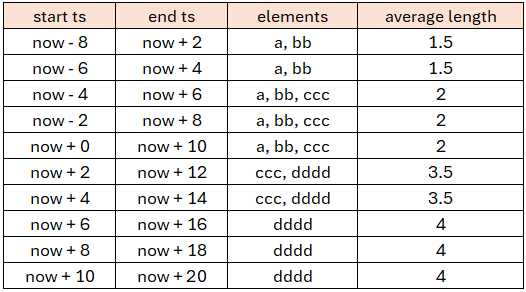
1# chapter2/sliding_window_word_length_test.py
2import datetime
3import unittest
4
5import apache_beam as beam
6from apache_beam.coders import coders
7from apache_beam.utils.timestamp import Timestamp
8from apache_beam.testing.test_pipeline import TestPipeline
9from apache_beam.testing.util import assert_that, equal_to
10from apache_beam.testing.test_stream import TestStream
11from apache_beam.transforms.window import TimestampedValue
12from apache_beam.options.pipeline_options import PipelineOptions, StandardOptions
13
14from sliding_window_word_length import CalculateAverageWordLength, AddWindowTS
15
16
17def create_dt(index: int):
18 return datetime.datetime.fromtimestamp(index - 8, tz=datetime.timezone.utc).replace(
19 tzinfo=None
20 )
21
22
23def to_rfc3339(dt: datetime.datetime):
24 return f'{dt.isoformat(sep="T", timespec="seconds")}Z'
25
26
27class SlidingWindowWordLengthTest(unittest.TestCase):
28 def test_windowing_behaviour(self):
29 options = PipelineOptions()
30 options.view_as(StandardOptions).streaming = True
31 with TestPipeline(options=options) as p:
32 now = 0
33 test_stream = (
34 TestStream(coder=coders.StrUtf8Coder())
35 .with_output_types(str)
36 .add_elements([TimestampedValue("a", Timestamp.of(now + 0))])
37 .add_elements([TimestampedValue("bb", Timestamp.of(now + 1.99))])
38 .add_elements([TimestampedValue("ccc", Timestamp.of(now + 5))])
39 .add_elements([TimestampedValue("dddd", Timestamp.of(now + 10))])
40 .advance_watermark_to_infinity()
41 )
42
43 output = (
44 p
45 | test_stream
46 | "CalculateAverageWordLength"
47 >> CalculateAverageWordLength(size=10, period=2)
48 | "AddWindowTS" >> beam.ParDo(AddWindowTS())
49 )
50
51 EXPECTED_VALUES = [1.5, 1.5, 2.0, 2.0, 2.0, 3.5, 3.5, 4.0, 4.0, 4.0]
52 EXPECTED_OUTPUT = [
53 (
54 to_rfc3339(create_dt(i * 2)),
55 to_rfc3339(create_dt(i * 2) + datetime.timedelta(seconds=10)),
56 EXPECTED_VALUES[i],
57 )
58 for i in range(len(EXPECTED_VALUES))
59 ]
60
61 assert_that(output, equal_to(EXPECTED_OUTPUT))
62
63
64if __name__ == "__main__":
65 unittest.main()
The pipeline can be tested as shown below.
1python chapter2/sliding_window_word_length_test.py -v
2test_windowing_behaviour (__main__.SlidingWindowWordLengthTest) ... ok
3
4----------------------------------------------------------------------
5Ran 1 test in 0.358s
6
7OK
Pipeline Execution
Similar to the previous example, we use the legacy read (--deprecated_read) while accepting default values of the other known arguments. Also, the pipeline is deployed on a local Flink cluster (--flink_master=localhost:8081). Do not forget to update the /etc/hosts file by adding an entry for host.docker.internal as mentioned earlier.
1## start the beam pipeline
2## exclude --flink_master if using an embedded cluster
3python chapter2/sliding_window_word_length.py --deprecated_read\
4 --job_name=slinding-word-length --runner FlinkRunner --flink_master=localhost:8081 \
5 --streaming --environment_type=LOOPBACK --parallelism=3 --checkpointing_interval=10000
On Flink UI, we can see two tasks in the job graph as well.
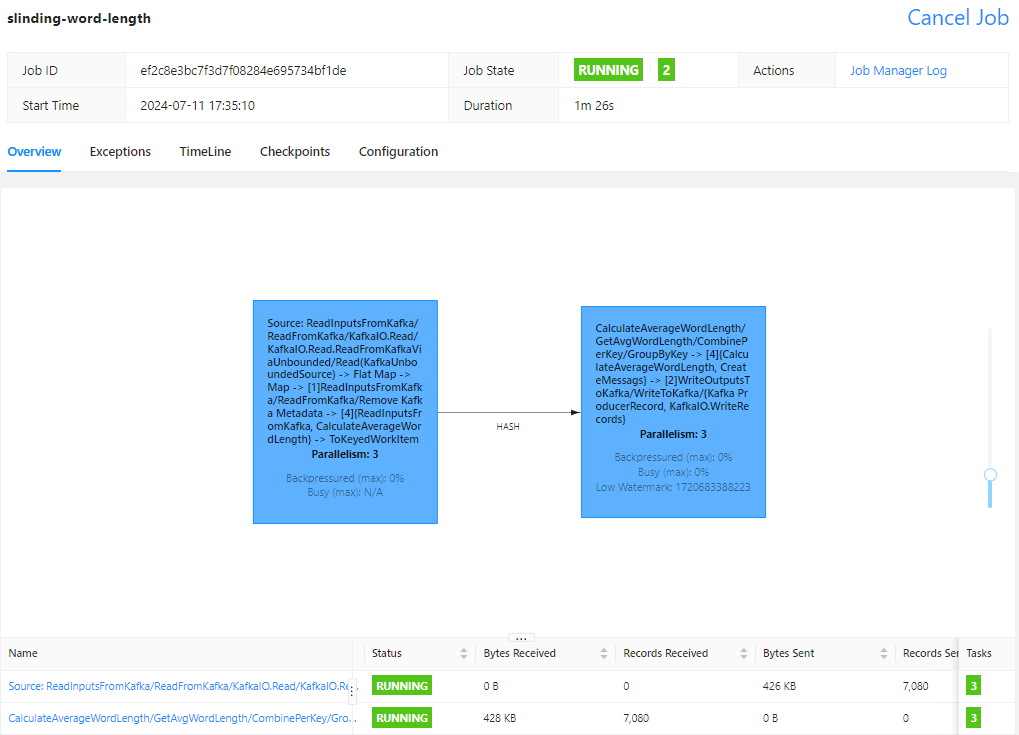
On Kafka UI, we can check the output message includes an average word length as well as window start/end timestamps.
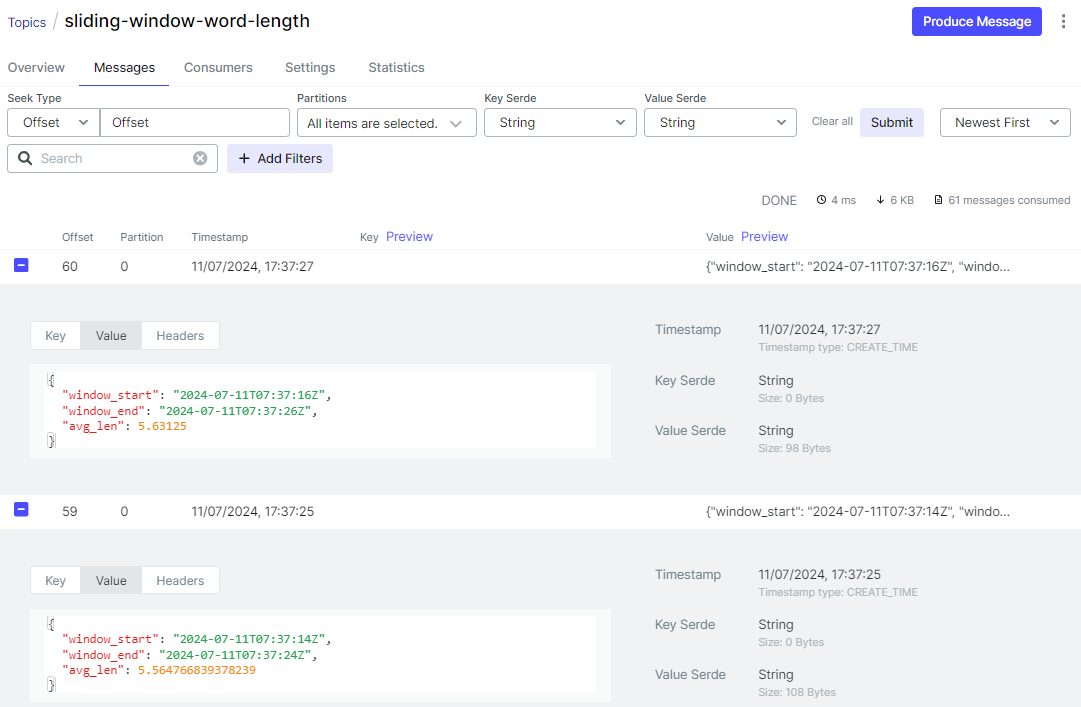











Comments